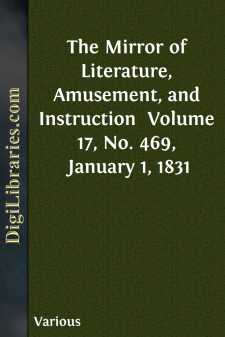Categories
- Antiques & Collectibles 13
- Architecture 36
- Art 48
- Bibles 22
- Biography & Autobiography 813
- Body, Mind & Spirit 142
- Business & Economics 28
- Children's Books 14
- Children's Fiction 11
- Computers 4
- Cooking 94
- Crafts & Hobbies 4
- Drama 346
- Education 46
- Family & Relationships 57
- Fiction 11829
- Games 19
- Gardening 17
- Health & Fitness 34
- History 1377
- House & Home 1
- Humor 147
- Juvenile Fiction 1873
- Juvenile Nonfiction 202
- Language Arts & Disciplines 88
- Law 16
- Literary Collections 686
- Literary Criticism 179
- Mathematics 13
- Medical 41
- Music 40
- Nature 179
- Non-Classifiable 1768
- Performing Arts 7
- Periodicals 1453
- Philosophy 64
- Photography 2
- Poetry 896
- Political Science 203
- Psychology 42
- Reference 154
- Religion 513
- Science 126
- Self-Help 84
- Social Science 81
- Sports & Recreation 34
- Study Aids 3
- Technology & Engineering 59
- Transportation 23
- Travel 463
- True Crime 29
The Mirror of Literature, Amusement, and Instruction Volume 17, No. 469, January 1, 1831
by: Various
Categories:
Description:
Excerpt
Petrarch and Arquà; Ariosto, Tasso, and Ferrara;—how delightfully are these names and sites linked in the fervour of Italian poetry. Lord Byron halted at these consecrated spots, in his "Pilgrimage" through the land of song:—
There is a tomb in Arquà;—rear'd in air,
Pillar'd in their sarcophagus, repose
The bones of Laura's lover: here repair
Many familiar with his well-sung woes,
The pilgrims of his genius. He arose
To raise a language, and his land reclaim
From the dull yoke of her barbaric foes:
Watering the tree which bears his lady's name
With his melodious tears, he gave himself to fame.
They keep his dust in Arquà, where he died;
The mountain-village where his latter days
Went down the vale of years; and 'tis their pride—
An honest pride—and let it be their praise,
To offer to the passing stranger's gaze
His mansion and his sepulchre; both plain
And venerably simple; such as raise
A feeling more accordant with his strain
Than if a pyramid form'd his monumental fane.
And the soft quiet hamlet where he dwelt
Is one of that complexion which seems made
For those who their mortality have felt,
And sought a refuge from their hopes decay'd
In the deep umbrage of a green hill's shade,
Which shows a distant prospect far away
Of busy cities, now in vain display'd,
For they can lure no further; and the ray
Of a bright sun can make sufficient holiday,
Developing the mountains, leaves, and flowers,
And shining in the brawling brook, where-by,
Clear as a current, glide the sauntering hours
With a calm languor, which, though to the eye
Idlesse it seem, hath its morality.
If from society we learn to live,
'Tis solitude should teach us how to die;
It hath no flatterers, vanity can give
No hollow aid; alone—man with his God must strive;
Or, it may be, with demons, who impair
The strength of better thoughts, and seek their prey
In melancholy bosoms, such as were
Of moody texture from their earliest day,
And loved to dwell in darkness and dismay,
Deeming themselves predestin'd to a doom
Which is not of the pangs that pass away;
Making the sun like blood, the earth a tomb,
The tomb a hell, and hell itself a murkier gloom.
The noble bard, not content with perpetuating Arquà in these soul-breathing stanzas, has appended to them the following note:—
Petrarch retired to Arquà immediately on his return from the unsuccessful attempt to visit Urban V. at Rome, in the year 1370, and, with the exception of his celebrated visit to Venice in company with Francesco Novello da Carrara, he appears to have passed the four last years of his life between that charming solitude and Padua. For four months previous to his death he was in a state of continual languor, and in the morning of July the 19th, in the year 1374, was found dead in his library chair with his head resting upon a book. The chair is still shown amongst the precious relics of Arquà, which, from the uninterrupted veneration that has been attached to every thing relative to this great man from the moment of his death to the present hour, have, it may be hoped, a better chance of authenticity than the Shaksperian memorials of Stratford-upon-Avon.
Arquà (for the last syllable is accented in pronunciation, although the analogy of the English language has been observed in the verse) is twelve miles from Padua, and about three miles on the right of the high road to Rovigo, in the bosom of the Euganean Hills....












